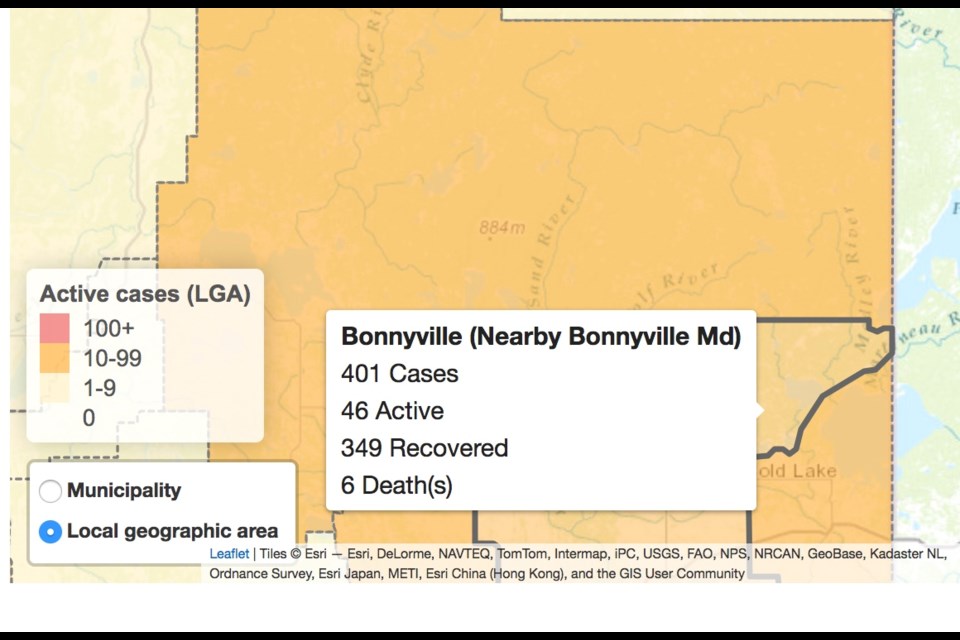LAKELAND - As reports of recent weeks have confirmed, Alberta is in short supply of COVID-19 vaccinations, which is delaying the second dose many need to be completely immunized from the virus. Across the Lakeland, thousands of people who were expecting vaccinations are now looking for answers.
Provincial officials say they are aware how frustrating the wait can be.
“We know that each and every dose of vaccine represents an Albertan that needs to be protected and is absolutely vital to protecting their health and their livelihood,” says Alberta's Deputy Minister of Municipal Affairs Paul Wynnyk.
His comments came at a recent 'town hall' teleconference where health officials answered questions from rural Alberta residents and municipal leaders about the impacts of the slower-than-anticipated vaccine rollout
“We’ve seen a dramatic decrease in vaccine supply over the past few weeks," said Wynnyk, re-defining the "rollout" as a near "standstill."
Despite the reductions, health officials say that more than 135,000 vaccines have been administered throughout Alberta, which includes 42,000 people who have received both required doses of the two-shot Pfizer vaccine, and are now fully immunized. Wynnyk says that Alberta Health will be doing everything they can to pick up from where they left off when they receive more shipments of the vaccine.
“We will continue to work with the federal government to get as many doses here in Alberta as quickly as we can,” said Wynnyk. “We are ready to hit the ground running.”
According to the planned distribution, February's vaccinations were part of the province's Phase 1A rollout and were to be given to healthcare workers in intensive care units, staff in long-term care facilities, all residents of long term care facilities, paramedics and EMRs. If there is enough vaccine supply, Phase 1B includes any senior over the age of 75 was eligible, as well as First Nation or Metis seniors over the age of 65 living in an Indigenous community.
The Phase 2 plan will continue to target populations at risk. Phase 2 was slated to run from April to September of this year. Phase 3 of the plan was scheduled to begin in October and offer vaccines to the general public.
Northern stats
Despite the current reductions in available vaccines, there have been 12,000 vaccines given out across the the Alberta Health Services' North Zone. Of that total, 284 doses were administered in the Lac La Biche area, 150 were given in the Bonnyville area, 245 were given in the Cold Lake area, and 1,561 were made available to the St. Paul community.
Tom McMillan, the assistant director of communications for Alberta Health says that even though the vaccines are administered in those communities, it doesn’t mean all of them are given to the residents who live there.
“The numbers provided reflect doses were administered at a particular site, but sometimes workers are travelling out of their community to receive vaccines,” said McMillan. “Doses of vaccines are not assigned to communities. Instead, they are being given to Albertans in the Phase 1A groups, regardless of where they are in the province.”
The North Zone of the province's health map includes most of the province's geography north of St. Albert. The north zone includes the Lakeland, as well as Fort McMurray and Wood Buffalo, Lesser Slave Lake, Peace River, Grande Prairie, Hinton, Jasper, and Westlock.
Number watch
As the province has moved into phase one of the new four-step framework for easing COVID-19 restrictions, allowing restaurants and recreational centres like gyms and community pools to partially open up again, Wynnyk says there will be noticeable differences from the last time provincial protocols were eased. He said current hospitalizations of COVID-19 related patients may be showing signs of slight decline, but the numbers are still far higher than when provincial officials attempted its first re-opening last year.
“When we relaunched last spring, we have to remember that there were only 57 people in Alberta in hospital, today there are 427,” said Wynnyk. “I know some wonder why we’re not easing more restrictions more quickly now, and why we are taking a different approach. We are being more cautious.”
In the days since the mid-week town hall session, hospitalizations numbers have continued to decline, with 397 reported on Friday. Across the Lakeland on Friday, there were 29 active cases reported in the Lac La Biche region, 46 in Bonnyville and the MD, 32 in the Cold Lake region, and 18 in the St. Paul region.
* With files from Rob McKinley



